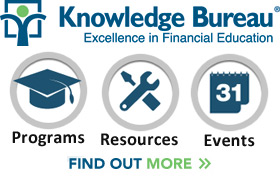
Immediate Expensing Rules: Good Tax Policy?
Over the course of the last two federal budgets (April 16, 2024 and November 4, 2025), the rules for claiming Capital Cost Allowance (CCA) have been uncertain. The proposal to extend immediate expensing rules for certain acquired assets were paused for over a year and then re-introduced in a series of four complex measures which together with new rules for Scientific Research and Experimental Development have become known as the “Productivity Super-Deduction”. A backdrop appears below. The key question: will this complexity be effective as an economic stimulator?What’s In Your 2024 Tax Season Toolkit?
 Now’s the time to start building your arsenal for next tax season! The new KB Tax Tip Toolkit gives you fast answers to your tax questions and you’ll earn up to 30 CE credits using it, too! Receive three great solutions at one great price: professional tax research library, powerful tax planning calculators, and CE accreditation, register by May 15.
Now’s the time to start building your arsenal for next tax season! The new KB Tax Tip Toolkit gives you fast answers to your tax questions and you’ll earn up to 30 CE credits using it, too! Receive three great solutions at one great price: professional tax research library, powerful tax planning calculators, and CE accreditation, register by May 15.
Need CE Credits? Grab an Hour & Be CE Savvy™
 Become a world-class leader in financial education with turn-key learning solutions from Knowledge Bureau! Creating a learning culture is the #1 driver of great work culture and it’s great for business too, introduce our new micro-course collections to the professional development program at your firm: your team can grab an hour and be CE Savvy™ while meeting CE requirements.
Become a world-class leader in financial education with turn-key learning solutions from Knowledge Bureau! Creating a learning culture is the #1 driver of great work culture and it’s great for business too, introduce our new micro-course collections to the professional development program at your firm: your team can grab an hour and be CE Savvy™ while meeting CE requirements.
Details of the New Tax-Free First Home Savings Account (FHSA)
 Tax-Free First Home Savings Account (FHSA) is the newest in a series of tax-advantaged savings accounts critical to the building of wealth, and it’s already a month old! The FHSA is a useful tool, not just for future homeowners but potentially for senior renters, business owners and others with limited RRSP room. Here is a checklist of rules investors will want to discuss with their advisors.
Tax-Free First Home Savings Account (FHSA) is the newest in a series of tax-advantaged savings accounts critical to the building of wealth, and it’s already a month old! The FHSA is a useful tool, not just for future homeowners but potentially for senior renters, business owners and others with limited RRSP room. Here is a checklist of rules investors will want to discuss with their advisors.
Higher Interest Won’t Lead to Faster CRA Debt Repayment, Pros Say
 The prescribed interest rate on overdue taxes is 9% for the second quarter. Will taxpayers now pay off tax debt sooner? Not according to 80% of tax and financial advisors who responded to our April poll. The pros say there are other factors to consider, including paying off other higher interest rate debt and they highlight that increases are only punitive when most taxpayers would pay off their CRA debt if they had the means to. Here are their comments:
The prescribed interest rate on overdue taxes is 9% for the second quarter. Will taxpayers now pay off tax debt sooner? Not according to 80% of tax and financial advisors who responded to our April poll. The pros say there are other factors to consider, including paying off other higher interest rate debt and they highlight that increases are only punitive when most taxpayers would pay off their CRA debt if they had the means to. Here are their comments:
RSVP by May 15: Improve Your Retired Client’s Financial Lives
 Last year was quite possibly the worst year in decades to retire and start drawing retirement income and so far in 2023, the foreseeable future is fraught with uncertainty. For these reasons we asked CE Summit keynote speaker and best-selling author Doug Nelson, B.Comm., CFP, CLU, CIM, RWM™ to share his inspiration in preparing his sessions for the upcoming May 24 CE Summits Workshop and expand upon the kind of retirement planning advice that’s right for today’s difficult environment. He was passionate in his response and provides a sneak peek at what you will learn.
Last year was quite possibly the worst year in decades to retire and start drawing retirement income and so far in 2023, the foreseeable future is fraught with uncertainty. For these reasons we asked CE Summit keynote speaker and best-selling author Doug Nelson, B.Comm., CFP, CLU, CIM, RWM™ to share his inspiration in preparing his sessions for the upcoming May 24 CE Summits Workshop and expand upon the kind of retirement planning advice that’s right for today’s difficult environment. He was passionate in his response and provides a sneak peek at what you will learn.


